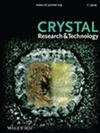Investigation on the Effects of MnCl2 Doping on Structural and Optical Properties of DAST Single Crystals as Materials for Second Order Nonlinear Optics
IF 1.9
4区 材料科学
Q3 CRYSTALLOGRAPHY
引用次数: 10
Abstract
The intent is to explore the optoelectronic properties of metal ions doped stilbazolium derivative, 4‐N,N′‐dimethylamino‐N‐methyl‐4‐stilbazolium tosylate (MnCl2‐DAST) nonlinear optical crystal materials for the existing technological necessities. The Mn‐DAST single crystals are crystallized by adopting the slow evaporation solution technique (SEST). The structural and crystallographic dimensions of grown crystals are affirmed using single‐crystal X‐ray diffraction and powder crystal X‐ray diffraction. Fourier transform infrared spectra are performed to explicate the functional groups and energy dispersive X‐ray analysis (EDAX) spectra confirm the presence of the chemical elements of grown crystals. The UV–vis absorption spectra of DAST and Mn‐DAST crystals exhibit all possible n–π* and π–π* electronic transitions. The blue shift is observed in the doped materials due to the exchange of lone pair electrons between the metal ions and organic molecule. Tremendously, the second order harmonic generation (SHG) efficiency of Mn (0.01 mol%) doped DAST crystals has 1.68 times larger than that of DAST crystal. From the metal‐organic crystals (Mn‐DAST), all the results brought out are the promising materials in the design of nonlinear optical applications.MnCl2掺杂对二阶非线性光学材料DAST单晶结构和光学性能影响的研究
目的是为了探索金属离子掺杂的二苯基唑衍生物,4 - N,N ' -二甲胺- N -甲基- 4 -苯基唑酸(MnCl2 - DAST)非线性光学晶体材料的光电性能,以满足现有技术的需要。采用慢蒸发溶液技术(sse)结晶Mn - DAST单晶。利用单晶X射线衍射和粉末晶体X射线衍射确定了生长晶体的结构和晶体尺寸。傅里叶变换红外光谱用来解释官能团,能量色散X射线分析(EDAX)光谱证实了生长晶体中化学元素的存在。DAST和Mn - DAST晶体的紫外-可见吸收光谱表现出所有可能的n -π *和π -π *电子跃迁。由于金属离子和有机分子之间的孤对电子交换,在掺杂材料中观察到蓝移。Mn(0.01 mol%)掺杂的DAST晶体的二阶谐波产生效率(SHG)是普通DAST晶体的1.68倍。从金属-有机晶体(Mn - DAST)中得出的所有结果都是非线性光学应用设计中有前途的材料。
本文章由计算机程序翻译,如有差异,请以英文原文为准。
求助全文
约1分钟内获得全文
求助全文
来源期刊
自引率
6.70%
发文量
121
审稿时长
1.9 months
期刊介绍:
The journal Crystal Research and Technology is a pure online Journal (since 2012).
Crystal Research and Technology is an international journal examining all aspects of research within experimental, industrial, and theoretical crystallography. The journal covers the relevant aspects of
-crystal growth techniques and phenomena (including bulk growth, thin films)
-modern crystalline materials (e.g. smart materials, nanocrystals, quasicrystals, liquid crystals)
-industrial crystallisation
-application of crystals in materials science, electronics, data storage, and optics
-experimental, simulation and theoretical studies of the structural properties of crystals
-crystallographic computing

 求助内容:
求助内容: 应助结果提醒方式:
应助结果提醒方式:


